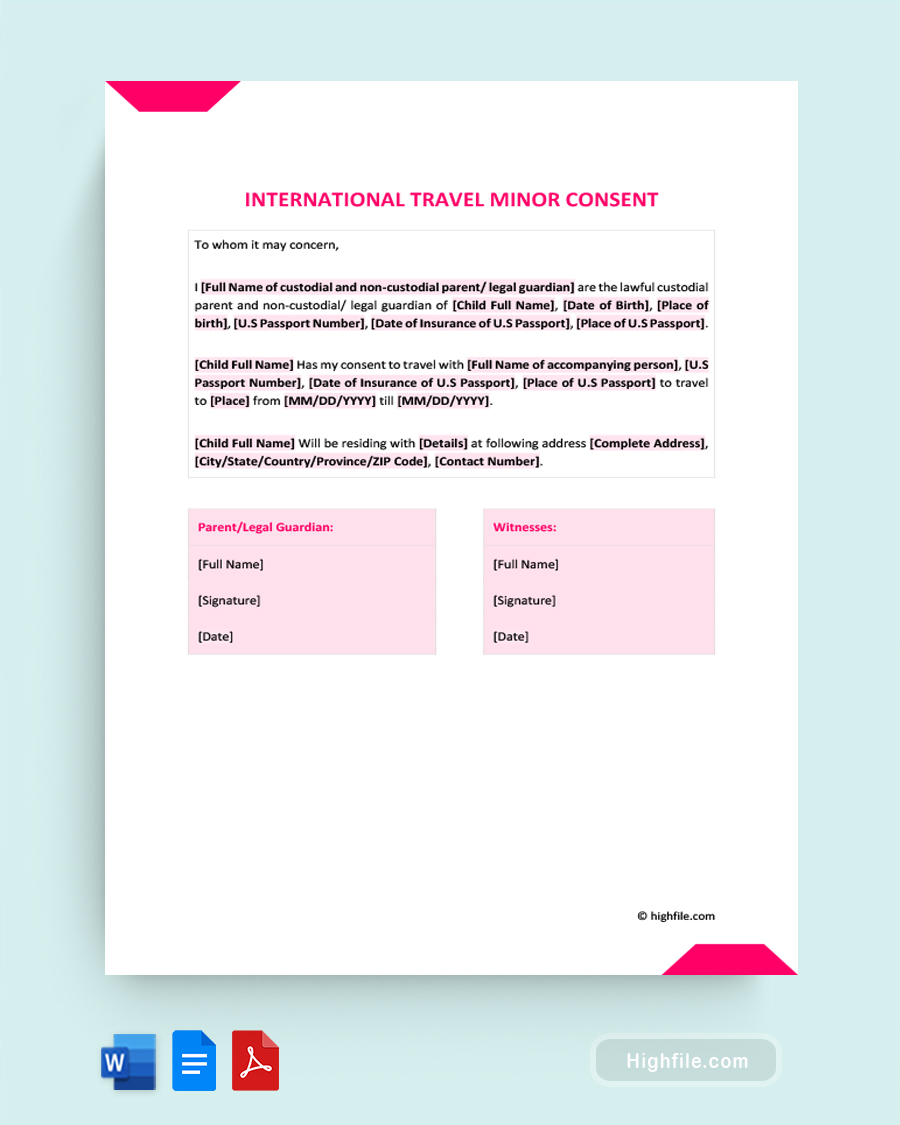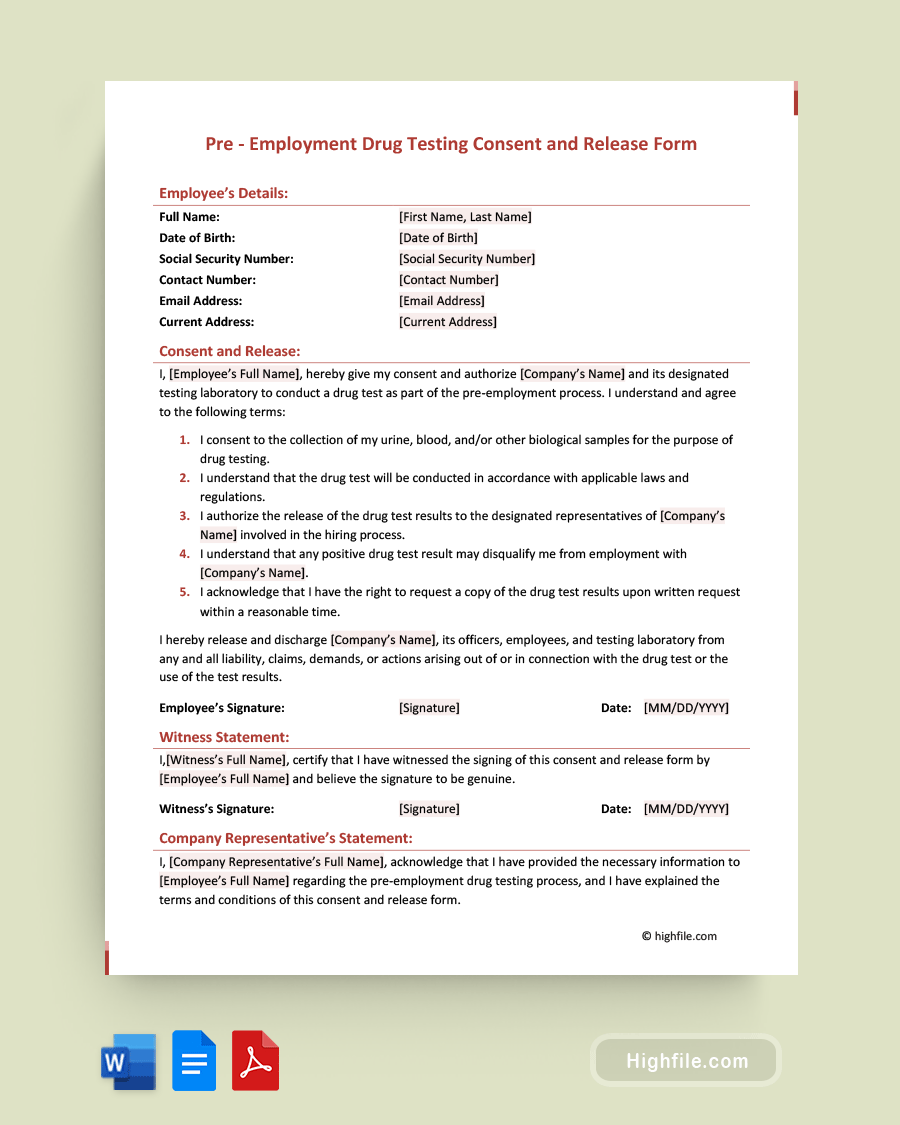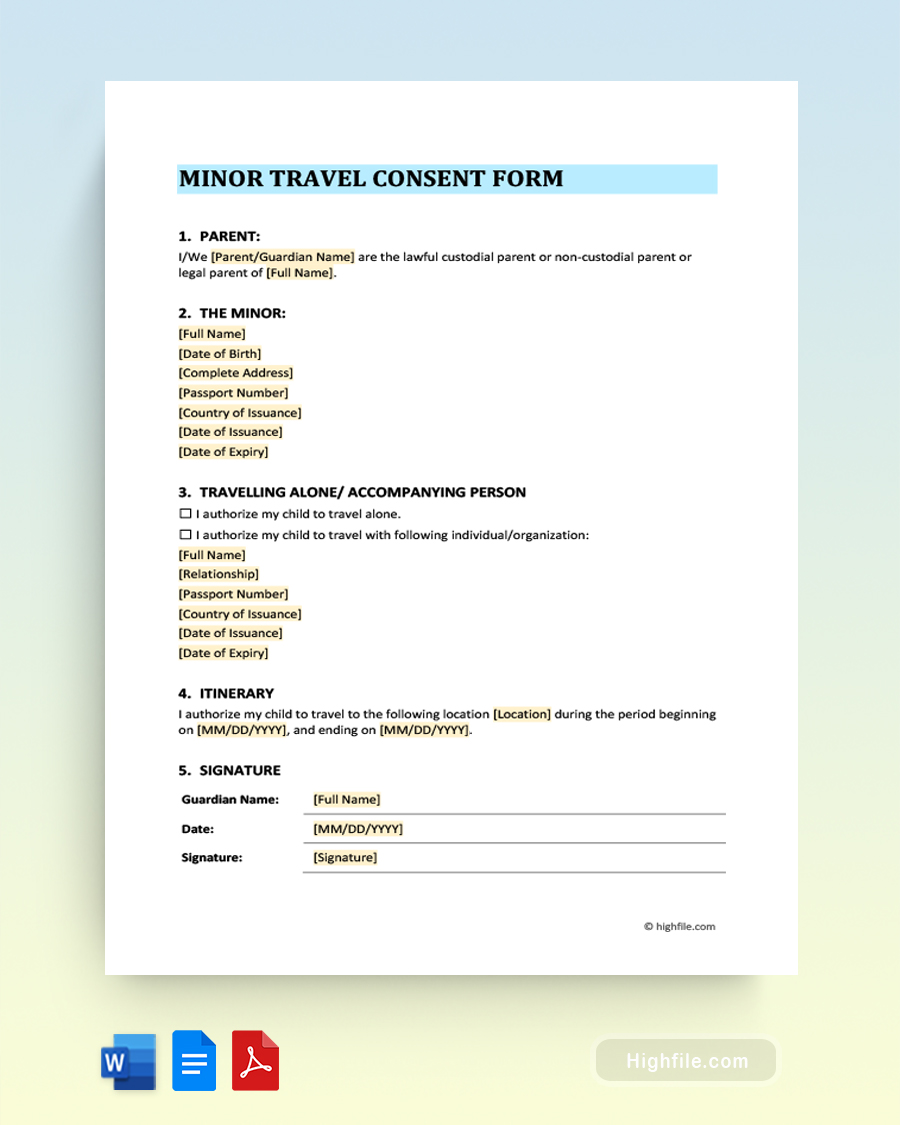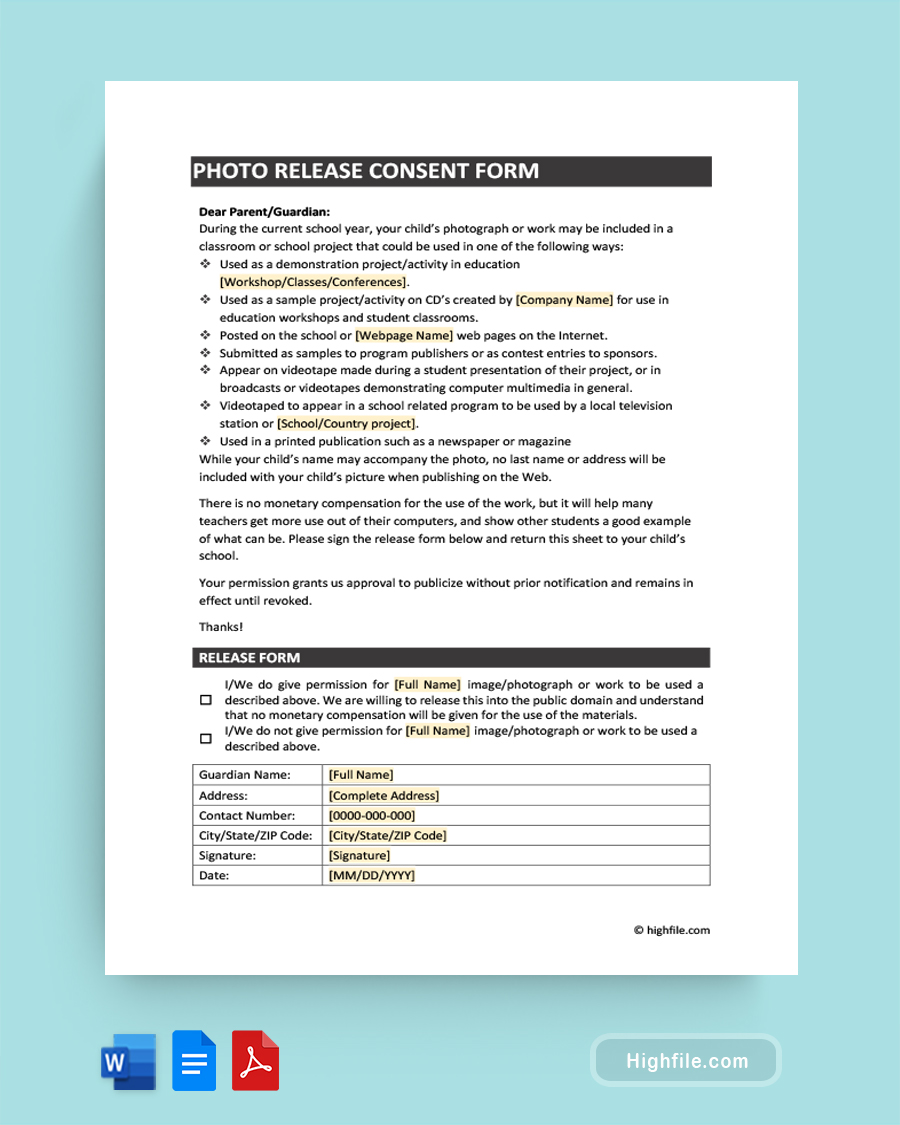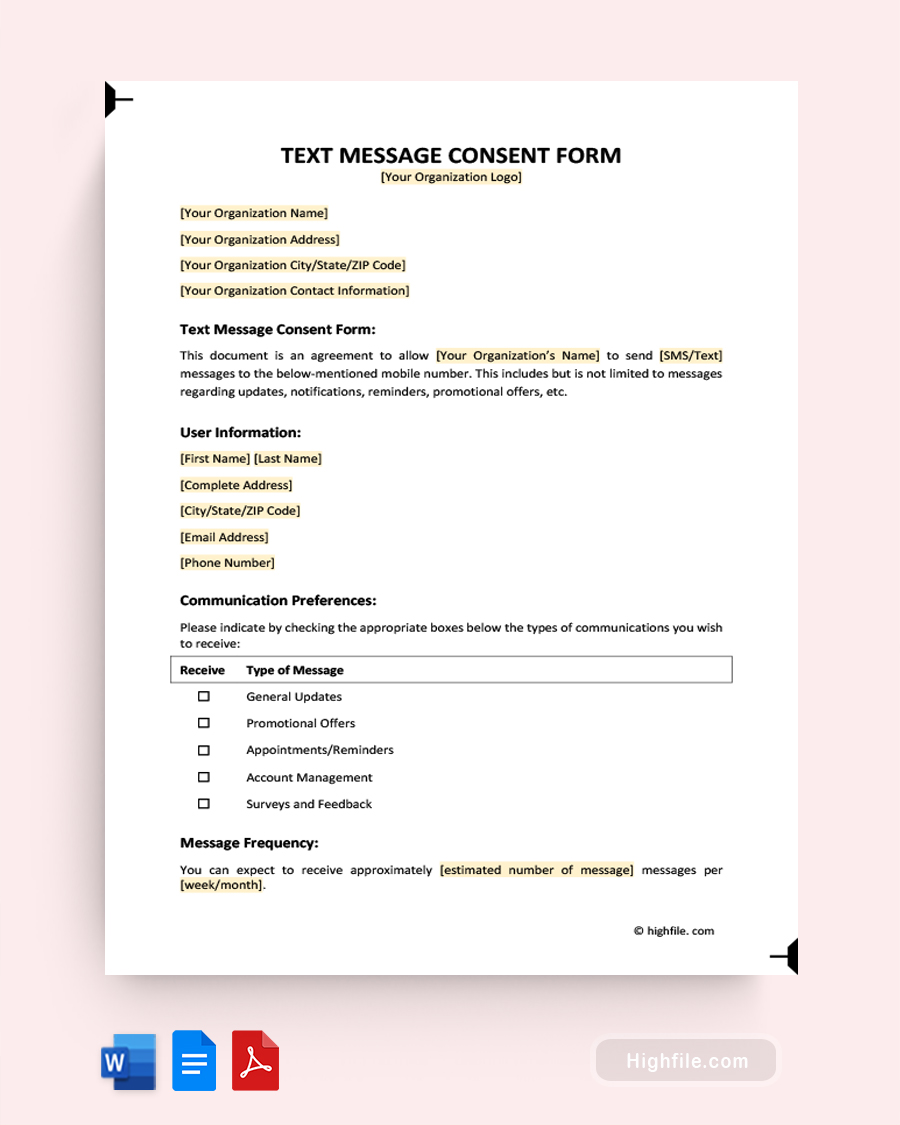Many children are forced to travel on their own domestically or to international destinations because one or both parents are unable to travel with them, and there is no guardian available to travel with them. Regardless of the reasons, children are generally not allowed to travel on their own if they are under the age of 12, and in most cases, one or both parents must provide consent for the child to travel.
In addition, children often travel with relatives or friends or with an organization of some kind on a school trip. In these situations, it is often a requirement of the group organizing the travel event as well as government organizations for the child to travel with a consent form signed by one or both parents. In this post, we will discuss what a travel minor consent form is, why they are important, and review the essential elements required in the form.
What Is an International Travel Minor Consent Form?
A child travel consent form can be used for both international and domestic travel. The form allows a minor child to travel without either of their parents or their legal guardian. The form should be used whenever the child must travel alone with an adult who is not their parent or legal guardian. The form must be signed by one of the parents or the child’s legal guardian. It is preferable to have both parents sign the travel consent form.
Minor children’s definitions vary by jurisdiction; however, they are considered to not have reached the age of majority. In most locales, the age of the majority is considered to be 18, while in some states and countries, the age can be 19, 20, or 21. Travel consent forms can be used for domestic and international travel on flights to and from the US. A travel minor consent form is also commonly referred to by the following terminology:
- Parental consent form
- Travel consent letter
- Travel permission letter
- Consent letter for children traveling abroad.
Why is an International Travel Minor Consent Form Important?
Many children are abducted every year and transported to other cities domestically or internationally. These abductions take place when strangers grab children and also when one parent feels they must move the child to another international location. The international travel minor consent form indicates that one or both parents or the child’s guardian have provided their approval for the child to travel to a specific destination. Without proof of a child’s travel consent, travel authorities may not allow the child to travel to the intended destination.
Common situations that require a domestic or international travel minor consent form include:
- Minor children traveling with only one of the parents when the parents are legally separated
- Students traveling as part of a school trip
- Sports teams, vacation tours, cultural or religious groups traveling with minor children
- Children escorted by a guardian, family members, grandparents, aunts, or uncles
- Anytime a minor is traveling alone on a plane, train, or by ship and meeting a parent or guardian at their destination.
A child prevented from traveling because they do not have a travel consent form can disrupt plans at both ends of their trip, cause embarrassment, and even suspicion of criminal activity. It is better to have the travel minor consent form completed with multiple copies – one for the child and one for parents or guardians at both ends of the trip.
In addition, US Customs and Border Protection recommend that any minor child traveling under the age of 16 with one parent or a guardian should travel with a notarized international travel minor consent form. The consent form should always be signed by both parents, and the signatures and form should be notarized to avoid any delays, missed flights, etc.
Parents should also check with the carrier, i.e., airline, train, or ship, to confirm their requirements for any child traveling without both parents or legal guardians. A child traveling to another country will need to meet whatever the destination country requires for children traveling without their parents or legal guardians. Always confirm the requirements with the host country before allowing your child to boarding an international flight.
Family situations can be complicated, especially when parents are legally separated. Legal separation usually awards custody to one parent with visitation rights to the other parent; however, these conditions can vary based on the court’s decision. Some countries, as well as border agents, i.e., Homeland Security, may require both the International travel minor consent form and a copy of the court order stating the rights of the custodial parent to travel with the child or to sign a consent form. Always check before initiating travel for your minor child
Essential Elements of International Travel Minor Consent Form
Every consent form should have the following basic information to ensure that all of the details are covered to the satisfaction of agencies reviewing the form. These essential elements include:
- Child’s full name
- Birth date and place of birth
- Passport details (Note that names and dates should correspond to the passport and any other forms of identification provided)
- Parent’s name or guardian’s name and custody details
- The parent or guardian’s passport information
- Contact information, including address, phone, and email addresses for non-traveling parent or guardian
- Provide the destination and the dates the child will travel
- Sign the consent form in front of a witness
- The witness should sign, print their name, date of signature, and provide contact information
International Travel Minor Consent Form – Notarization
Although there will be a small fee to have your consent form notarized, it is often required by other countries, which can expedite your child’s travel. The notary will confirm the child’s identity and the parent or guardian’s identity and witness all signatures. They affix their seal to the document, which is considered an asset when traveling and entering other countries.
Always check the requirements of other countries for both entry as well as exiting the country. Without the proper documents, your child may not be allowed to enter the country or leave the country, which can create a great deal of unneeded stress for everyone.
FAQs
The following are several frequently asked questions many parents and guardians have regarding minors traveling alone domestically and internationally.
If you are traveling with a minor internationally, perhaps escorting them to their final destination, it is important to have all of the required documents with you and the child. These include:
ᐅ Boarding pass for the child and yourself
ᐅ Birth certificate and passport for both parties
ᐅ Preferably a notarized parental or guardian consent form
Note travel consent forms do not allow the person escorting the minor child to make medical decisions on behalf of the child. A child medical consent form should be added, which provides the child’s medical history, current medication, emergency contacts, and any treatments that are allowed to be provided to the child.
In addition to a child medical consent form, the following documents may also be needed depending on the situation and needs of the child. These include:
ᐅ Power of attorney for the Child authorizing the escort to make parental decisions for the child
ᐅ Child care contract coving situations where a child care provider is contracted to provide care for the child
ᐅ Child visitation letter covering the rights of divorced or separated parents to visit the child as stated in court documents
Every country and carrier has a variety of regulations covering whether a minor can travel with or without their parents. Parents or guardians planning to send a child on their own using a carrier (plane, train, or ship) should first check with the host country and the carrier for the specific requirements and provide the required documentation.
Domestic and international travel have different requirements as well. In general, the following guidelines apply:
ᐅ All minors under the age of 18 should carry a travel consent form
ᐅ Children 8 years of age and older can fly with connections but must be escorted by airline personnel to their gate
ᐅ Children must be 5 years of age or older to travel alone; however, it must be a direct flight and no connections
Regardless of these requirements, common sense should prevail. Some children are more mature than others and can handle travel on their own. There are many flight delays and changes in the industry. Can your child deal with changes or delays in flights or even cancellations?
The best witness for a child travel consent form is a notary public, who will verify identities, and documentation and affix their seal and signature to the document. However, not everyone has the time or the funds to pay for a notary.
Anyone can witness the signatures of the parents or guardians. They must provide their information details and sign and print their names in the designated space. A witness is only verifying the signature of the guardian or the parent. They do not verify court requirements in situations where a divorce or legal separation defines specific requirements for travel.
Key Points
Many children must travel alone to meet up with a parent in situations where there is a legal or divorce situation. School trips, group trips, and excursions also fall into this category. A travel minor consent form should always be provided and accompany the child providing the consent of the parent or guardian for the child to travel to a destination.
Notarized consent forms, passports, birth certificates, and court documents covering separations or divorces may also be required by some carriers (plane, train, or ship) as well as host countries for the child to enter the country and also exit the country once their trip is completed.
Children traveling alone or with one parent can be refused travel if authorities feel that proper consent has not been provided by the other parent or both parents.
Guardians, family members, and friends of the family must also carry parental travel consent for a minor when they are escorting the minor to a distant destination. Travel consent forms do not cover medical care and parental care decisions. These situations should be covered by other documents providing the necessary details and requirements.
